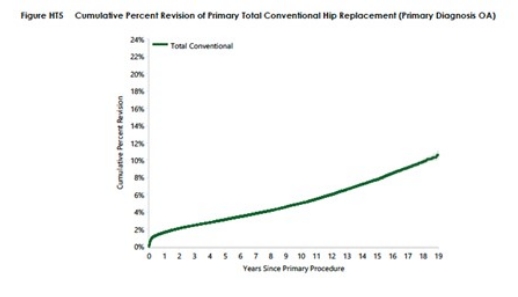When deciding whether to undergo a total hip replacement, many patients are concerned about the longevity of the prosthesis. Quite often patients have received inaccurate information about the lifespan of hip replacements. In the past, health professionals have often quoted various figures such as 8 years or 12 years, and many in the community continue to mention these numbers. There are many reasons factors that can contribute to the need for revision of a hip replacement and this means that it is impossible to actually provide an exact figure that relates perfectly to each individual.
The most common reasons for a hip replacement to be revised include loosening of the implant, fracture of the bone around the prosthesis, infection and recurrent dislocations. Less common reasons for revision include pain, leg length discrepancy, implant breakage or wear, and malposition of the prosthesis.
The Australian Orthopaedic Association (AOA) developed a National Joint Replacement Registry in 1999. This registry records details from almost every hip replacement done throughout Australia. Every time a revision of a hip replacement is done, this is recorded and used to generate annual reports on the rate of revision. Relevant data from the registry can help surgeons and patients to make an educated decision regarding hip replacement surgery.
The most common to reason to undergo a Total Hip Replacement is for osteoarthritis. The latest registry report indicates that the chance of needing a revision hip replacement after 19 years is 10.6%. Most of my patients find this figure to be surprisingly low.
Male patients have a slightly higher risk of revision at 11.7% after 19 years, and 9.6% for females. Patients under the age of 55 have higher revision rates than those over 75 years. The average age of hip replacement recipients in Australia is 67 years. Obesity and poor general health can also impact revision rates.
The registry data also helps surgeons to choose a type of prosthesis with lower revision rates and to avoid prostheses with higher rates of revision. My preferred prosthesis has 15 years of data from over 69000 procedures, with a revision rate of 5.4% after 15 years.
There is no simple answer to the question of how long a hip replacement will last, but hopefully this data summary will help patients to have a greater understanding of the issue. I would be happy to discuss this in greater detail in your consultation.


